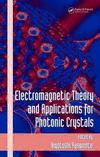
Electromagnetic Theory and Applications for Photonic Crystals PDF
457 Pages·2005·30.504 MB·English
Most books are stored in the elastic cloud where traffic is expensive. For this reason, we have a limit on daily download.
Preview Electromagnetic Theory and Applications for Photonic Crystals
Description:
Photonic technology promises much faster computing, massive parallel processing, and an evolutionary step in the digital age. The search continues for devices that will enable this paradigm, and these devices will be based on photonic crystals. Modeling is a key process in developing crystals with the desired characteristics and performance, and Electromagnetic Theory and Applications for Photonic Crystals provides the electromagnetic-theoretical models that can be effectively applied to modeling photonic crystals and related optical devices.The book supplies eight self-contained chapters that detail various analytical, numerical, and computational approaches to the modeling of scattering and guiding problems. For each model, the chapter begins with a brief introduction, detailed formulations of periodic structures and photonic crystals, and practical applications to photonic crystal devices. Expert contributors discuss the scattering matrix method, multipole theory of scattering and propagation, model of layered periodic arrays for photonic crystals, the multiple multipole program, the mode-matching method for periodic metallic structures, the method of lines, the finite-difference frequency-domain technique, and the finite-difference time-domain technique.Based on original research and application efforts, Electromagnetic Theory and Applications for Photonic Crystals supplies a broad array of practical tools for analyzing and designing devices that will form the basis for a new age in computing.
See more
The list of books you might like
Most books are stored in the elastic cloud where traffic is expensive. For this reason, we have a limit on daily download.
